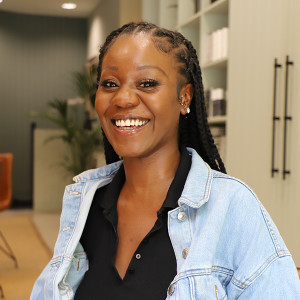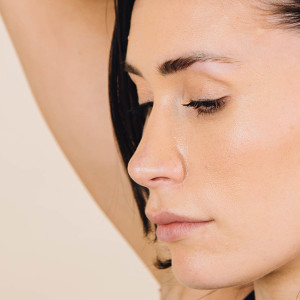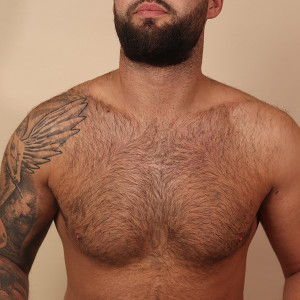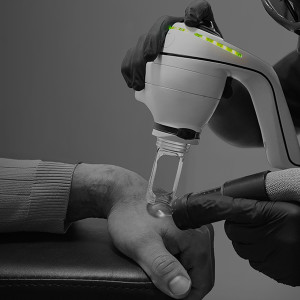Frequently asked questions
Here is the expert advice and detailed information on tattoo removal at NAAMA Studios. If you have a specific question or concern, please get in touch.
Treatment
The LightSense® laser system emits a precise beam of energy that shatters the ink pigment through a combination of photothermal and photoacoustic effects. Macrophages ingest the resultant tiny ink particles, before they’re evacuated through the lymphatic system. This elegant process is repeated until all of the ink is removed.
Watch our how-it-works video here.
Yes, it is possible to completely remove a tattoo with the LightSense® laser system.
For a specific evaluation of your individual tattoo, contact us and discover how our experts can help you to achieve your goals. A complete tattoo removal is possible but there are certainly things you can do to improve the chances of full clearance.
It takes an average of 8-12 sessions to completely remove a tattoo, with treatments as often as every 2-3 weeks. Tattoo removal isn't linear and differs from person to person.
There are three crucial factors that impact how long it will take: the laser, your tattoo, and your health.
NAAMA uses LightSense®, the most advanced pico laser. Read about how your tattoo and immune system can speed up the tattoo removal process.
*Your specific amount of downtime will be assessed during your initial consultation and may change during the course of treatment. We can only treat as often as every 2-3 weeks for Fitzpatrick 1-3 skin types.
Yes, microblading is one of our most popular treatments. The precision of the LightSense® laser means that we can treat intricate tattoos with extreme care and accurate direction. Our low-energy technology significantly reduces the chance of any damage to the skin and allows for more frequent treatments.
Tattoo removal is less painful with LightSense®. Our proprietary laser technology operates using 34x less energy than the average pico laser and has a 92x shorter pulse width, making laser tattoo removal treatments at NAAMA significantly gentler on the skin. So much so, 70% of clients describe treatment as only "slightly uncomfortable."
We treat tattoos as often as every 2-3 weeks. Thanks to the skin-kind LightSense® laser system, NAAMA clients require minimal downtime between sessions.
Read more about the laser.
No, we do not recommend tattoo removal when pregnant. Although there is no evidence to suggest that laser tattoo removal treatments cause problems during pregnancy, we strongly advise against them when pregnant.
This is mostly down to the fact that hormonal changes may negatively influence the success of treatment, meaning that you could end up requiring more treatments.
Please reach out to us post-pregnancy to start your removal and read our blog on the subject.
No, with LightSense® adverse effects are extremely rare. However, during treatment there is the possibility that you’ll experience the following typical reactions:
79 in 100 experience redness, which can be alleviated with the NAAMA aftercare cream.
41 in 100 experience swelling, again which can be alleviated with an aftercare cream.
As few as 24 in 100 people experience pinpoint bleeding (also called petechiae, it’s absolutely normal and refers to when some of the small blood vessels near the surface of the skin burst leaving temporary redness.)
For the likelihood of side effects read our informed consent document. If you notice other reactions or are concerned in any way, please contact us at consultation@naamastudios.com.
Most tattoos are made from quality, safe ink pigments, and respond well to treatment. On average it takes 8-12 sessions to completely clear tattoo ink.
Inks that don’t respond as well to tattoo removal are referred to as “stubborn” and can take a longer time to remove. In severe cases, some inks may not respond to laser removal at all. However, this is very rare.
Read our blog on tattoo ink here and speak to a nurse for an assessment of your tattoo.
Our experts recommend waiting until your tattoo has completely healed which can take around 6-8 weeks after first getting the tattoo before you start your removal sessions. This is so that the skin is in the best condition for laser tattoo removal.
Yes, we can successfully fade tattoos for cover-ups and we do partial removals as well. We usually recommend five sessions for tattoo fade, though this can vary between different tattoo styles, colors, and designs.
Read more about lightening a tattoo here.
Stay hydrated, rest well, and enjoy exercise. The better the state of your general health, the more likely your immune system will respond positively to treatment.
Additionally, we advise that you protect your skin with a sun-safe skincare routine and use a moisturizing sunscreen with high SPF when exposing your treatment area to direct sunlight within two weeks of your treatment.
You may be asked to shave if the removal area is densely covered with hair. We will not ask you to shave your eyebrows. Speak to our expert nurses for more information.
We welcome and are able to treat all skin types at NAAMA.
Black ink can be treated on all skin tones, but there are some limitations on treating color inks on darker skin tones due to an increased risk of skin damage. We can only safely treat colored inks on Fitzpatrick 1-3 skin types.
Speak to one of our experts and get a personal assessment, or read more on our blog.
The NAAMA difference
We have spent 10 years developing the world’s fastest tattoo removal laser technology - the LightSense® laser system. It’s quick, effective, and prevents damage to your skin. It’s only available at our NYC studio under the supervision of our expertly trained team of NAAMA nurses.
Your NAAMA tattoo removal journey starts with a consultation and session. We then take detailed images of your tattoo so that we can track the progress of your removal.
A nurse will design a bespoke treatment plan for you and ensure that the area is dressed properly. When you leave the studio, you’ll be given aftercare guidance. For more on aftercare, read our blog.
The LightSense® laser system is the most advanced pico laser. It is faster, safer, and more effective.
It works on ultra-low energy, which means less pain, lower risk of skin damage, and the opportunity to enjoy treatments as often as every 2-3 weeks.
Read more about the LightSense® laser system here.
NAAMA nurses are trained according to protocols developed by expert dermatologists. Drawing on previous experience from leading healthcare and hospitality practices, all nurses hold the required industry certifications such as NVQ L3. When they start with NAAMA they undergo a 10-day education program, far more rigorous than the 3-day market standard. They are also experts at using the LightSense® laser system, as we are the only studio you’ll find it in.
Cost
Our New York tattoo removal pricing is coming soon.
We offer financing options at NAAMA because we believe in flexibility. Financing is provided through PayPal, with specific terms and conditions to be found on our financing page.
You should check with your insurer as to whether they will reimburse costs associated with tattoo removal. We do not accept insurance, though you might be able to arrange reimbursement or co-pay with your insurer directly.
We offer financing options at NAAMA because we believe in flexibility. Financing is provided through PayPal, with specific terms and conditions to be found on our financing page.
Results
Yes. Once the ink pigment is removed, it won't come back, leaving you with clean, healthy, and smooth skin.
It takes an average of 8-12 sessions to completely remove a tattoo, with treatments as often as every 2-3 weeks. Tattoo removal isn't linear and differs from person to person.
We remove approximately 10% of the tattoo each session, but you might not see visible results until the third. The process is working under the surface, in the dermis. We will show you the ink clearing with a dermatascope (a handheld magnifying tool).
Watch our animation to see how the process of tattoo removal works.
*Your specific amount of downtime will be assessed during your initial consultation and may change during the course of treatment. We can only treat as often as every 2-3 weeks for Fitzpatrick 1-3 skin types.
Aftercare
We recommend NAAMA Plus: it's our highly-curated offering of IV therapy, lymphatic drainage massage, and a range of specially-designed skincare products.
Staying safe in the sun, avoiding alcohol, and keeping hydrated will all improve your tattoo clearance.
NAAMA Plus is our highly-curated offering of IV therapy, lymphatic drainage massage, and a range of specially-designed skincare products. It helps in the following ways:
Lymphatic drainage massage can help to stimulate the flow of lymph throughout the body. This is the mechanism that removes unwanted ink pigment.
IV therapy supercharges tattoo removal results by providing the body with a blend of vitamins, nutrients, electrolytes, minerals and antioxidants.
Our Heliocare 360° SPF will keep your skin safe before treatments.
Yes, the low-energy LightSense® laser system leaves skin clear and healthy, ready for what’s next. We also partner with leading tattoo artists who welcome the opportunity to create striking cover-up tattoos. We’re happy to recommend an artist for your next piece.
We choose not to use tattoo removal creams. That's all we'll say.
The technology for laser tattoo removal has come so far in recent decades, and we are such firm believers in the power of tech to solve dermatological challenges in a safe and efficient manner, that we just don't have time for anything else.
Permanent Makeup Removal
Yes, the good news is you can. We offer a number of permanent makeup removal treatments at NAAMA, including:
Eyebrow tattoo removal: microblading; microshading; and ombre.
Permanent lip blushing; lip liner; and lip color tattooing.
Face and scalp treatment removal, such as hairline microblading; scalp micropigmentation; and freckle tattoos.
Because skin-safety is paramount at NAAMA, we only use the ultra-precise LightSense® laser system for PMU removal.
You can come to NAAMA for permanent makeup removal as early as six weeks after it’s done. However, the safety of your skin is our priority, so we will not treat it until it’s fully healed.
If you’re unsure whether your skin is ready for treatment, please contact us for a consultation.
Permanent makeup removal is not ‘one size fits all’ and each case is completely unique.
As a guide, we suggest 1-3 sessions for light microblading removal and 3 minimum for machine brows or denser eyebrow tattoos. Many clients get their desired results in 3-5 sessions, but this varies. Our removal packages are a great option to explore for better value per session. The timescale is similar if you’re looking to come to NAAMA for lip blushing and lip tattoo removal, too.
Your nurse will advise when to return for your next laser tattoo removal session at the end of each appointment.
The gentle LightSense® laser system uses significantly less energy than traditional laser tattoo removal devices and clients can return for treatment as often as every 2-3 weeks in some cases* for faster results.
*Your specific amount of downtime will be assessed during your initial consultation and may change during the course of treatment. We can only treat as often as every 2-3 weeks for Fitzpatrick 1-3 skin types.
Some people see results after one session, but the speed of the process will vary depending on the tattoo, the tech used, and the health of the immune system.
Once begun, the process happens inside the dermis. We use a dermatoscope to record the progress of your removal and track results.
There is always a risk of oxidation with permanent makeup. When permanent makeup oxidizes, we usually see the ink develop red and then yellow tones.
Prior to treatment, we will assess your skin according to the Fitzpatrick scale. On Fitzpatrick 1-3 skin tones (lighter), oxidized ink can be treated successfully. On Fitzpatrick 4-6 skin types (darker), permanent makeup tends to oxidize to red and purple tones, which is more difficult to successfully treat. In this case, we use a 1064 nm laser - a wavelength that’s particularly good for tackling black ink - to lighten the ink.
Seeing success in these instances is challenging, but our specialist nurses will be able to recommend a treatment course that is right for you. Lip blushing can be removed on Fitzpatrick 1-3 skin types. However, there is a risk of oxidation to gray, which remains throughout the treatment process.
If you’re concerned about oxidation, we recommend a patch test.
Side effects are generally very mild for eyebrow tattoo and microblading removal. You might temporarily see some slight redness around the area or experience what we call ‘frosting’
Frosting is a natural reaction when the laser hits the targeted ink and isn’t any cause for concern. It usually goes away after 10 minutes or so, but can last for up to 48 hours in some cases.
If you have particularly dense eyebrow tattooing, you’re more likely to experience some redness or pinpoint bleeding as we need to work deeper to target the ink. However, we’ll discuss this with you during your consultation so you know exactly what to expect.
Don’t worry, your eyebrows will not be burned during treatment (this is why we don’t need you to shave prior to your session!). Our revolutionary laser system is superior when it comes to skin-safety and you can apply makeup to the treated area as soon as the next day.
In very rare cases, clients may temporarily experience mild hair loss following treatment. However, as we do not work deep enough to target the hair follicle, there is no long-term damage and the hair will regrow.
Our favorite question!
The LightSense® laser system is the most advanced pico laser. It is FDA-cleared, CE-certified and backed by rigorous clinical studies.
It is gentle (using 34X less energy than the average pico laser) for use on sensitive areas of the body, like the face.
With a spot size 11X more precise than the average pico laser we treat with supreme accuracy.
The laser is adept at removing colored inks, making it ideal for permanent makeup removal.
It’s exclusive to us, so you’ll only find it at NAAMA.







